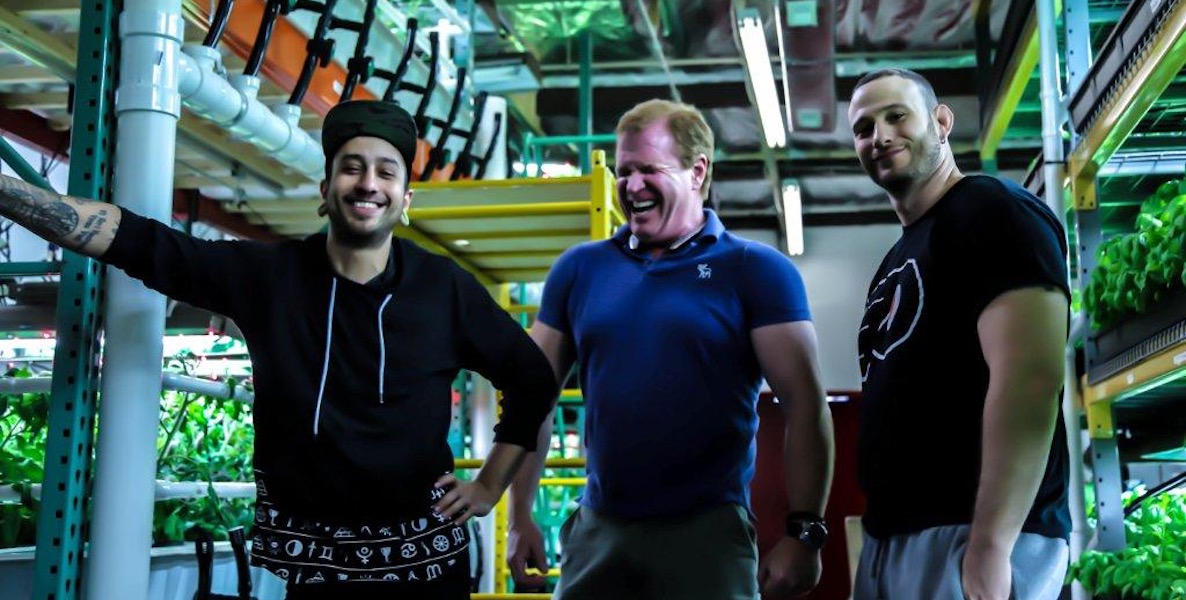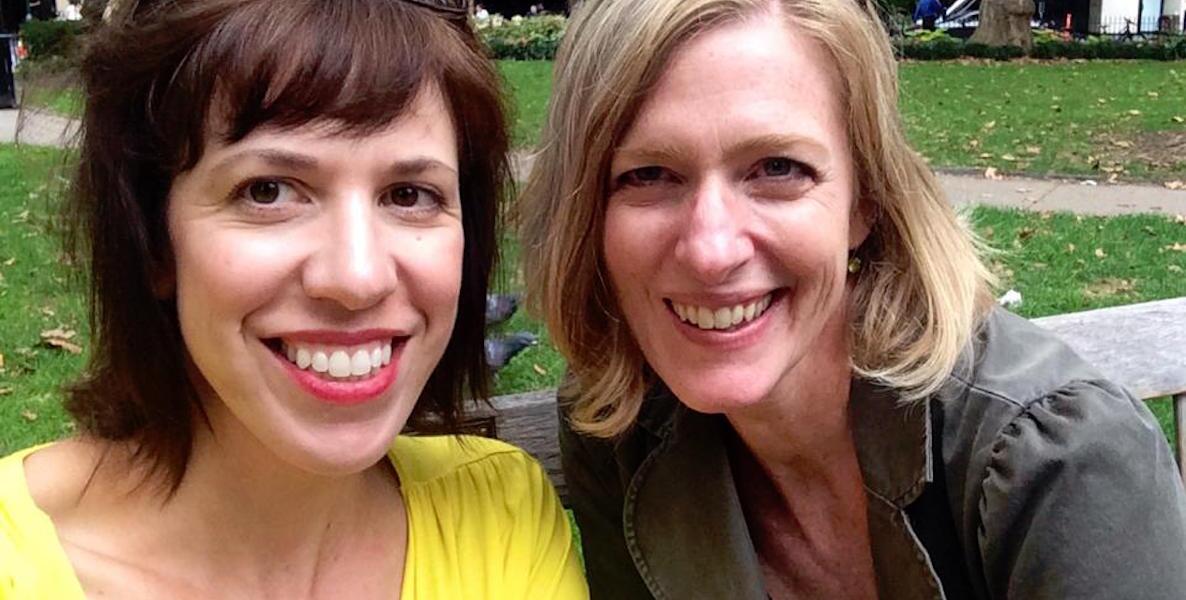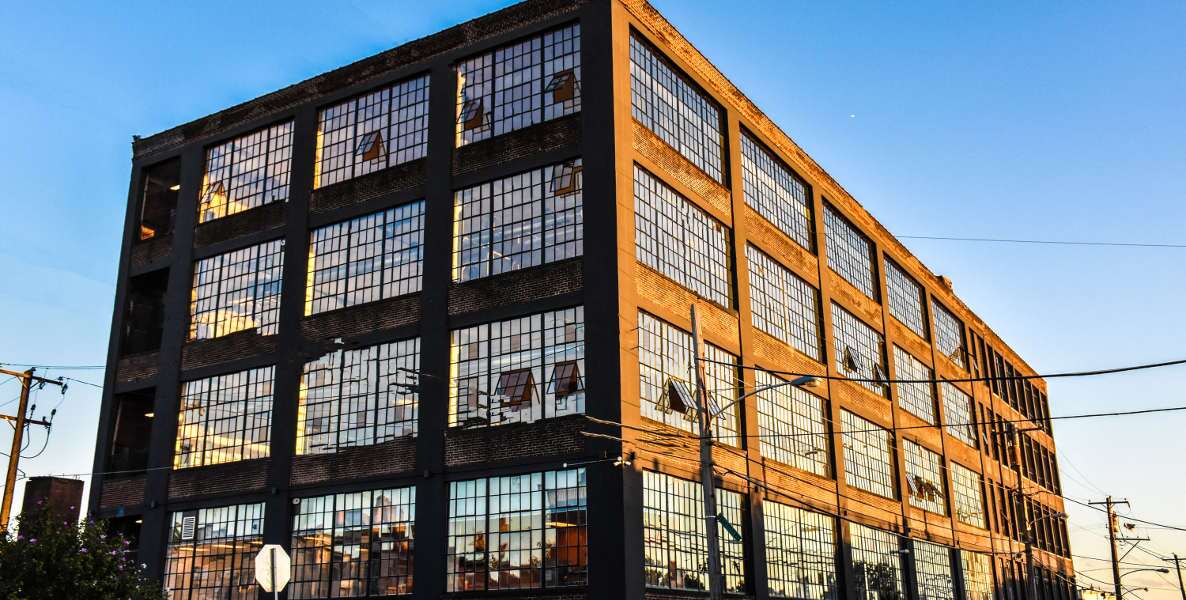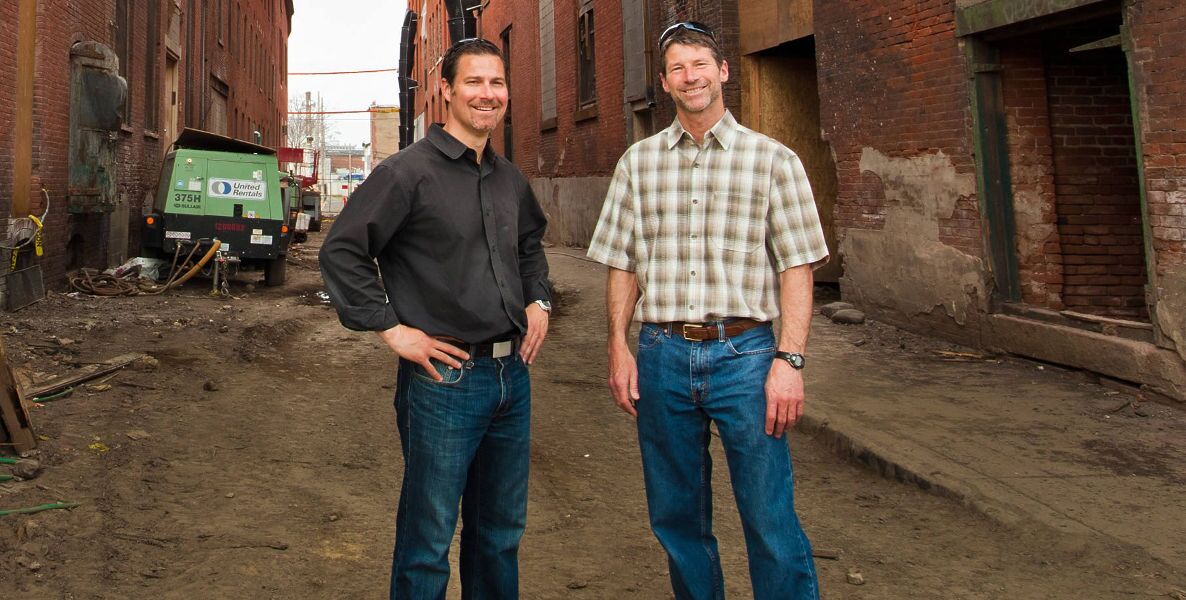On a beautiful day in Kensington earlier this month, Shift Capital COO Matthew Grande pulls out a large slide showing various angles of the interior of a truly massive factory building and grins with real admiration. We’re in the headquarters of MaKen, Shift Capital’s Kensington development project; the place is incandescently white and smells like a dentist’s office.
“This one’s my favorite,” Grande says. He’s looking at a building that Shift has acquired in North Philly as part of its big development play, which he says focuses on revitalizing commercial spaces in North Philly that have fallen into disuse and renovating Kensington homes. The former factory space, to be called “MaKen City” is set to host major business in the short future.
The conference room at MaKen’s headquarters on Castor Street—a block away from a check cashing joint, three blocks away from a Dunkin Donuts—is littered with presentation materials, depicting gorgeous new residential rowhomes and storefronts that look like they’ve been copied and pasted from a San Francisco sidewalk. It doesn’t look very Kensington. The script already seems written. Developer moves in, plants flag of upper-middle hipster coolness and mobility at the highest point, eats up real estate, slowly converts blue collar, dirty area into a place where you can send both your dog and baby to Montessori-inspired day cares.
“At the end of the day, we are a for-profit development company,” says Grande. “But our goal is to have as much social impact as financial impact.”
But Shift Capital is attempting to fight that trend, promising to incorporate a more holistic, inclusive and neighborhood-friendly approach to development. To begin with, Grande says the residential spaces that Shift renovates as part of its MaKen project will have a shockingly low price point, at least at the beginning of their availability.
“Between $650 and $750 for a two bedroom,” says Grande. He says that Shift has received loads of applications from neighborhood residents who want in to MaKen’s residential spaces. “A lot of these people just want to switch out what they have for something a little better.”
But what about those boardroom mockups? They are, according to Grande, a distant goal; they won’t be knocking down acres of rowhomes, a la Fishtown, he promises. Instead, to avoid altering the character of the neighborhood, MaKen is staying away from teardowns and major outdoor alterations, and focusing on interior renovations .
MaKen does plan on changing the character of the neighborhood—for the better, Grande hopes. The company plans to line the streets of Kensington with solar-powered trash cans to help fight the area’s litter problem. It is working with the Philadelphia Parks and Recreation Department and Philadelphia Tree People to plant new trees outside of the homes of people in the neighborhood who request them.
And it’s trying to work environmental consciousness into its construction practices as well. According to Grande, some of its newer developments and renovations will incorporate what’s known as “Blueroof” technology, which helps control the rate at which runoff water is released into the sewer system. MaKen’s construction crews are also salvaging as much as they can from the residential spaces they’re renovating, and is considering implementing solar panels into its MaKen City project.
And the group’s ambitions don’t end there. Grande says MaKen wants its future community projects, ranging from urban gardens to trash cleanup, to be staffed and directed by current members of the Kensington community. And Shift has hired Michael Cosack, a former investment consultant who has served on the board of two education nonprofits and of a charter school in Newark, as Chief Financial Officer, hoping he’ll bring his expertise to help improve education in the neighborhood. Grande says that three or four area charter schools have already reached out to them, and Shift wants Cosack to evaluate and advise on the education situation in Kensington.
If the plans seem extensive, it’s because the project itself is massive. MaKen aspires to acquire twice the amount of footage it currently has, roughly 1.5 million square feet, within the next decade. According to Grande, Shift currently controls about 100 residential buildings and about 15 mixed-use commercial and residential buildings.
“We’re trying to lease six industrial buildings right now,” says Grande.
As MaKen has recognized, Kensington has long been in need of revitalization. The neighborhood, once among the most booming in Philadelphia’s long-past “Workshop of the World” period, now has among the highest unemployment rates in the city. The group’s two buildings in Kensington, MaKen North and MaKen South — which include office, commercial and industrial space — are renovated and nearly ready to host new tenants. Grande says MaKen has studied employers and builders from the Pacific Northwest to Detroit to New York City in its quest to bring sustainable industry to Philadelphia.
“We’re not interested in turning these old industrial buildings into condos,” says Grande. “We’re interested in bringing jobs back to these buildings.”
Grande is quick to note that MaKen can only truly effect positive change through the properties it owns. “At the end of the day, we are a for-profit development company,” says Grande. “But our goal is to have as much social impact as financial impact.” It’s worth noting that MaKen is part of a trend of new socially-conscious development in Philly. In fact, the group isn’t the first socially-conscious developer to make a play in Kensington; in 2014, D3 Developers opened an apartment complex in South Kensington that offers discounts to teachers and education nonprofits.
Prior to coming to Philadelphia and taking over as Shift Capital’s chief operations officer, Grande worked at Accenture, as a senior manager, before doing freelance financial work. “I spent 12 years in New York, working in capital markets. The reason I left that world is that I realized I wasn’t making a positive impact on the world — I could probably argue that I was making a negative impact,” he says. Part of his prior work included helping financial institutions make sure that they didn’t get caught for their misdeeds, something he found too objectionable to continue doing.
Burned out from his work in Manhattan, the South Jersey native who attended St. Joe’s prep and Villanova, moved to Philadelphia, where he ran into his childhood buddy Brian Murray, who had since become CEO of Shift Capital. Taken by his friend’s pitch, combining real estate development and neighborhood improvement, Grande did freelance work for Shift before joining the staff full time this past February.
“I looked across all of my clients and projects, and there was nothing as impactful as this,” he says. “It’s awesome being in a room with people who know what the challenges are. I’ve been exposed to challenges that I never could have dreamed of, but it’s just opportunities to meet more interesting, innovative thinkers.”
Photo header: via Matthew Grande, Shift Capital







